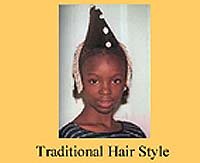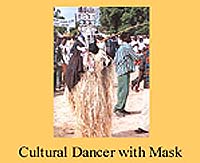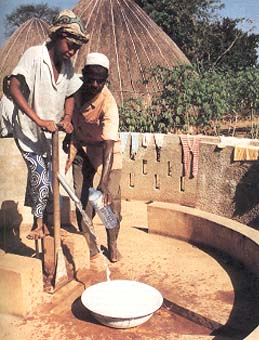|
Economy:
Guinea contains industries like fruit canning, fish packing, printing, automobile assembly, and the manufacture of
aluminum utensils and plastics. The country has abundant natural resources, including 25% of the world’s known reserves
of bauxite, along with diamonds, gold, and other metals. The country also has great potential for hydroelectric power.
While bauxite and aluminum are currently the only major exports, the Guinean government plans to encourage the mining
of other resources. Other industries include processing plants for beer, juices, soft drinks and tobacco. Agriculture
employs 80% of the nation’s labor force. The government encourages a free market economy and is determined to promote
foreign investment. There is an ongoing privatization program, in line with the government’s poverty-focused model of
development which reserves a key role for the private sector. Guinea's current growth levels, though encouraging, are
considered by most observers to be still below potential, especially in view of the country's tremendous natural resource
endowments. The national economy is still relatively undiversified and preponderantly reliant on bauxite and mining
revenue. There is also considerable scope for improvement in revenue mobilization. Guinea's social indicators compare
poorly with neighboring countries in sub-saharan Africa, although significant strides have recently been made in primary
education and access to safe water.
BANKING
For business people and companies depending on many and complicated financial transactions we can warmly recommend
IC Bank (International Commercial Bank/Malaysia) which recently also opened a branch office at Siaka Stevens Street in
Freetown. Ask for Mr. Sashi Nair/CEO +224-415450 and tell him Mister Willems send you. Mr. Nair also is the Regional
Manager West Africa. IC Bank has offices in Accra/Ghana and Freetown/Sierra Leone. The Conakry was awarded Best
Bank of 2004 by Financial Times.
For business information and assistance you can contact us at +232-76-822971 or by e-mail to
WILLEM
History:
|
Guinea was once a part of the great Mali Empire. Guinea became a French colony in 1890 with much resistence and hostility
from the people and with the French removing or destroying most of their equipment as they left. Guinea covers 94,000
square miles and is divided into four regions: the coast of lower Guinea; the central, mountainous Fouta Djalon; the
savanna of upper Guinea; and the forest in the southeast. For thousands of years, Guinea was populated by various peoples.
In the tenth century A.D., Soussou and Malinke groups began to move into the area. Upper Guinea was part of the Ghana
Empire in the 10th and 11th centuries, the Mali Empire until the 14th century, and the Songhai Empire until the 19th
century. The Fulani moved into Guinea in the 17th century, bringing Islam with them and pushing the Soussou to coastal
areas. French rule began in the 19th century. After World War II, several labor parties were established, including the
Parti Democratique de Guinee led by Ahmed Sekou Toure. In 1958, this party organized support to vote against Charles de
Gaulle’s proposed French community and then declared independence, resulting in Guinea being cut off from France’s
financial aid and other assistance programs. Guinea was also shunned by other Western nations and, in this relative
isolation, developed a strong national identity. Sekou Toure governed a one-party state and progressively developed
strong dictatorial tendencies. He survived several attempted coups and continued to rule Guinea until his death in 1984.
Two weeks later, the military took control of the government and established the Second Guinean Republic under Lansana
Conte. Presidential and parliamentary elections took place in late 1993 and Lansana Conte was declared president. He
again won the presidential elections in 1998 and died December 22, 2008. At that stage the National Counsil for Democracy and
Development (NCDD) took over power and appointed the 44 years old army captain Moussou Dadis Camara as 2nd President of the
3rd Republic of Guinea. President Camara promised to hold transparant and free elections within approx. 1 year.
|
|

Traditional hairstyle
©2001: Tourist Office
|

Masked Dancers
©2002: Tourist Office
|

Water Well
©2002: Tourist Office
|
|
Last update: 9 January 2009
|

